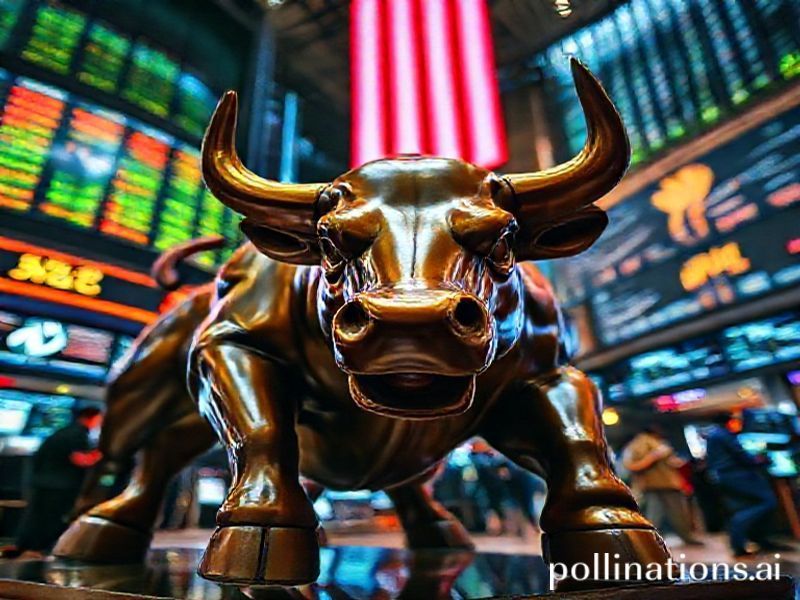Bull Stock: The Internet’s Newest Obsession—Where Finance Meets Meme Culture
# **Bull Stock: The Market’s Newest Meme, or the Next Big Short?**
In the grand theater of internet culture, where trends are born, die, and sometimes rise from the ashes like a phoenix made of memes, there’s a new player in town: **Bull Stock**. No, it’s not a new cryptocurrency or a viral TikTok dance—it’s a fascinating blend of Wall Street bravado and internet meme culture that’s got everyone from day traders to meme lords buzzing.
### **What is Bull Stock?**
Bull Stock refers to the sudden surge in interest around stocks that are, well, *bullish*—meaning they’re on the rise or expected to rise. But here’s the twist: this trend isn’t just about financial gains. It’s about the *culture* around it. The internet has turned stock trading into a spectator sport, complete with memes, inside jokes, and even a sense of community that rivals any fandom.
Think of it as the financial equivalent of a viral TikTok trend, but with more spreadsheets and fewer dance moves. Bull Stock is trending globally because it taps into two things people love: money and memes.
### **The Cultural Context: From WallStreetBets to WallStreetMemes**
The rise of Bull Stock can be traced back to the Reddit community **WallStreetBets**, where retail investors turned trading into a high-stakes game of chicken. The **GameStop short squeeze** in early 2021 was the ultimate flex—a David vs. Goliath story where everyday traders banded together to stick it to the hedge funds.
But Bull Stock isn’t just about rebellion. It’s about the *performance* of trading. The internet has turned stock charts into memes, with traders using terms like “diamond hands” (holding onto stocks no matter what) and “paper hands” (selling at the first sign of trouble) as badges of honor.
Social media platforms like Twitter, Reddit, and even TikTok have turned stock trading into a form of entertainment. People don’t just trade stocks—they *perform* their trades, sharing their wins (and losses) with an audience that’s equal parts supportive and brutally honest.
### **The Social Impact: Democratizing Finance or Just Another Bubble?**
Bull Stock has democratized finance in a way that’s never been seen before. Retail investors now have a voice, and they’re using it—loudly. The rise of commission-free trading apps like Robinhood and Webull has made it easier than ever for anyone with a smartphone to jump into the market.
But with great power comes great responsibility—or at least, great memes. The social impact of Bull Stock is a double-edged sword. On one hand, it’s empowering everyday people to take control of their financial futures. On the hand, it’s also creating a culture where risk-taking is glorified, and FOMO (Fear Of Missing Out) drives more decisions than actual market analysis.
The internet’s love affair with Bull Stock has also led to some… interesting trends. From **meme stocks** like AMC and GameStop to the rise of **SPACs** (Special Purpose Acquisition Companies), the market is now as much about storytelling as it is about fundamentals. And let’s not forget the **NFT craze**, which has blurred the lines between finance and digital art in ways that would make even the most seasoned trader scratch their head.
### **Why Bull Stock Matters**
Bull Stock matters because it’s a reflection of our times. It’s a blend of finance, technology, and internet culture that’s reshaping how we think about money. It’s not just about making a quick buck—it’s about being part of a community, sharing in the wins and losses, and turning the stock market into a global watercooler conversation.
But here’s the thing: Bull Stock isn’t just a trend. It’s a cultural shift. It’s a sign that the internet isn’t just changing how we communicate—it’s changing how we invest, how we think about money, and how we participate in the global economy.
So, whether you’re a seasoned trader or just someone who enjoys the occasional meme, Bull Stock is a trend worth watching. Because in the end, it’s not just about the money—it’s about the story.
—







